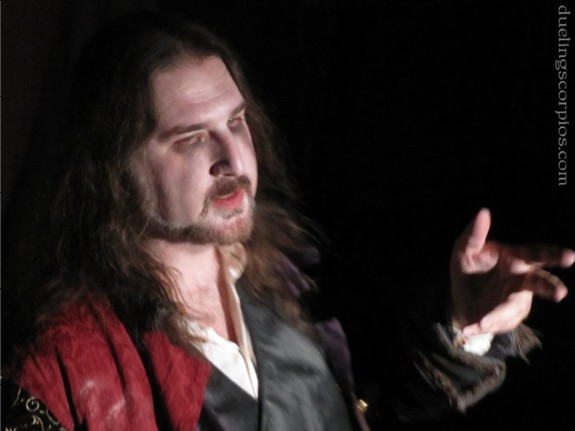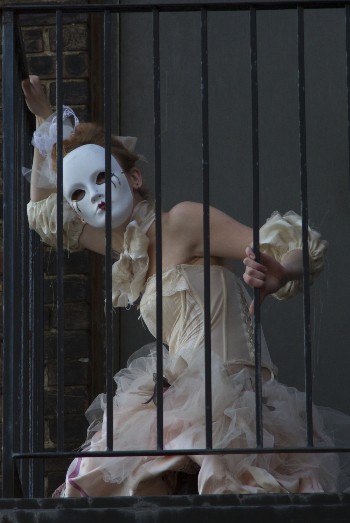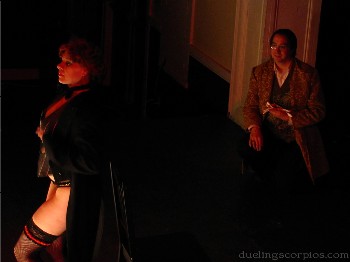Theater Review: A Rousing Night of Burlesque at The Wrathskellar
Given the power, glory, and fun the Boston Babydolls supply with their burlesque routines—pasties and nipple tassels whirl with furious aplomb—the lack of spooky payoff in The Wrathskellar amounts to a minor drawback.
The Wrathskellar. Concept and direction by Scratch. Choreography by Betty Blaize. Presented by the Boston Babydolls at 545 Cambridge Street, East Cambridge, MA, through October 31.
By Bill Marx
I am not sure what this says about the state of burlesque in America, but The Wrathskellar is the second time this theater season I have watched on stage a woman spinning tassels on the tips of her breasts. In September, Bad Daddy came to Oberon from LA—a considerable part of the musical featured go-go girls stripping off their tops and rhythmically waving their festooned chests hither and yon. The musical was such a hapless mishmash—wavering between a stale story of clashing generations and adolescent satiric shenanigans—that I didn’t bother to write about it.
Still, the entertainment did add a potential new spin to the tautological ad campaign of the American Repertory Theater and Oberon, which assures YouTube groupies that live theater is live by pointing out, via a photograph, the proximity of the performer and the audience members. Here is a new ad: The photo shows You sitting in your seat here—the woman spinning the tassels counter-clockwise on her tits is there, close enough for You to ogle closely.
Thankfully, the expert burlesque of the Boston Babydolls is far from the jaded antics of retro-LA go-go girls. I have missed the troupe’s annual Halloween show until now, though I had good fortune of seeing this year’s version performed in a space the troupe commandeered in East Cambridge, an unfinished storefront transformed into a “Sweeney Todd, Jack the Ripper” inspired pub. Patrons sit at small tables, a comely waitress wafts by from time to time to offer soft drinks and candies, the Boston Babydolls strut and wiggle their stuff on stages surrounding audiences members (including a space cut out of a wall), and the proprietor/MC Herr Teufel Bücher (Scratch) provides deadpan-to-the-point-of-stillborn, misanthropic, comic patter in between the performances. The space hasn’t quite come together as a convincing facsimile of a Victorian drinking hole, but it is dramatically effective nonetheless. Perhaps there had been a terrific fight in the tavern the night before, and Bücher chose to open up despite the damage.
The goal of The Wrathskellar is to fuse exaggerated burlesque moves with the Victorian macabre, to aesthetically intertwine sexual tease with intimations of sadistic violence. I say aesthetically because this is not crude burlesque, which has its virtues when it is honest rather than smarmy, but burlesque of the art house variety—smart and inventive rather than (parody) cheesy or salacious. (No nudity—pasties and nipple tassels aplenty) This is not to say The Wrathskeller doesn’t exude plenty of erotic pizazz. Alas, I saw the show on press night and theater critics, prone to be puritanical and emotionally inert, didn’t let out many wolf whistles or guttural howls. (I will not reveal the names of those who did.)
There was plenty to whistle at and admire: the attractive dancers are usually garbed in colorful (red, white, black) intimate apparel, mostly circa late 19th century—fishnet stockings, garter belts, long silky gloves, etc. As for the ample curves of the Boston Babydolls, I share the preference of Edmund Wilson (yes, the literary critic), who, when reviewing a burlesque show at New York’s National Winter Garden in 1925, opined that he “had no use for the slim legs and shallow breasts . . . of the modern American taste.” The Boston Babydolls are women of substance and bravo for that.
They are also skillful dancers with plenty of libidinal charisma and a tart sense of humor. Some of the routines playfully send up fetishes, such as farcical number where a whip-wielding tamer (Miss Mina Murray) keeps her “animals” in a cage, which they quickly escape from to wreak sensual vengeance. Some of my favorite performances include Scarlet (Fonda Feeling) removing her top and gloves via gymnastic contortions while suspended in the air on a lyra, choreographer Betty Blaize’s physically demanding and frenzied fusion of belly dance and burlesque, performed with a breathless determination that leaves her tassels flying like propellers-out-of-hell, and the classic, flirty dexterity of Brigette Bisoux.

Herr Bücher (Scratch) supplies misanthropic one-lines at The Wrathskellar. Photo: Bri Crofton of Dueling Scorpios
Given the premise that we are in the Wrathskellar, it would be good (perhaps I am speaking out of self-interest) if the female performers could be brought into the audience space more, setting the dramatic action off-stage. There is one winning attempt in that direction: an “innocent” (Elise Ratchford) gets up from one of the tables asking to audition for The Wrathskellar. She goes on to sing an amusing rendition of “Bushel and a Peck,” inviting the crowd to sing-along. More of that playful combination of spectator and performer would create a more compelling “environmental ” experience.
If the tassels and pasties orbit with hypnotic grace, the other ingredient promised by The Wrathskellar, the thrills of the damned, could use some more punch. The horror elements don’t come off with much sinister snip-and-snap—the transformation of an “innocent” into a mature vixen and the return of a naughty, Victorian doll back to her box are not particularly shudder-inducing. And while I admire Herr Bücher’s chilled-to-bone one-liners—delivered in white face with a slow-mo, Alfred-Hitchcock-inspired drawl—it is too repetitious an approach to supply the kind of zesty, “low” humor that is an essential part of a burlesque show. In the past, secondary and tertiary clowns delivered japes and skits that often juggled sex and death. (Wilson, for example, enthuses about a “remarkable” gallows routine.)
But given the power, glory, and fun that the Boston Babydolls supply, the lack of spooky payoff in The Wrathskellar amounts to a minor drawback. My biggest complaint is that the tavern only serves soft drinks and green tea (how New Age Cantabrigian!) when entertainment this rousing calls for servings of the hard stuff.
Bill Marx is the editor-in-chief of The Arts Fuse. For over three decades, he has written about arts and culture for print, broadcast, and online. He has regularly reviewed theater for National Public Radio Station WBUR and The Boston Globe. He created and edited WBUR Online Arts, a cultural webzine that in 2004 won an Online Journalism Award for Specialty Journalism. In 2007 he created The Arts Fuse, an online magazine dedicated to covering arts and culture in Boston and throughout New England.


